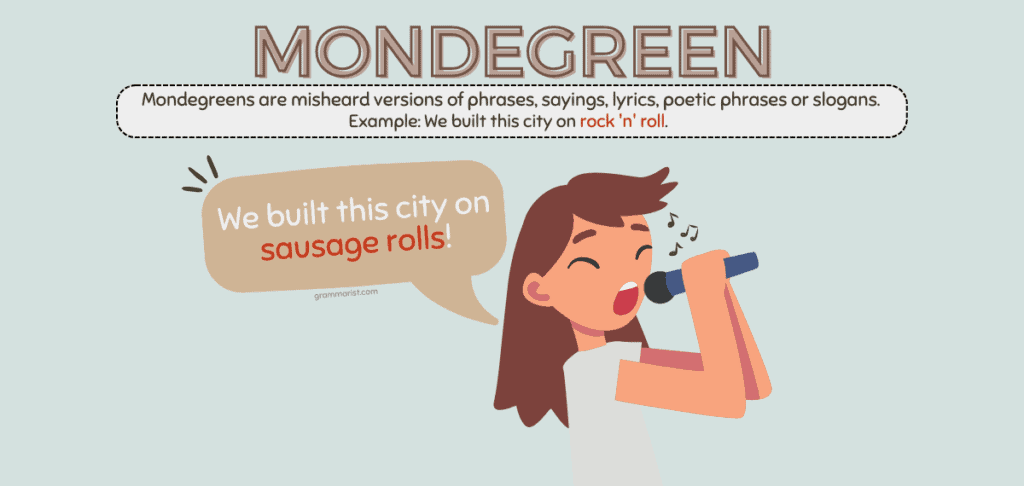The English language is full of strange words that are obsolete in their use yet describe day-to-day events, happenings and regular human practices. These words are generally unknown to native speakers and can be downright confusing to anyone who encounters them, despite their familiar definitions.
A mondegreen is one of these words. Although it sounds as if it doesn’t belong in the lexicon of language, it is actually defined by a common, everyday practice. Let’s learn about what this word means, who came up with it in the first place, and common examples of its use.
What Is the Meaning of a Mondegreen?

Mondegreens are misheard versions of phrases, sayings, lyrics, poetic phrases or slogans. The mishearing of these leads to misinterpretations and gives rise to new, similar-sounding sayings that offer new and often unique meanings.
It is important to understand that the new interpretations aren’t supposed to make sense when taken literally. There is actually another term used for misinterpretations that make complete sense and can serve as a true replacement for the original. These are called eggcorns, and we will discuss them further below.
Common Examples of Mondegreens
Now that you are familiar with how mondegreens work, you probably are thinking of all the times you have made the mistake of mishearing something and coming up with your own definitions.
Here are some common song lyric mondegreens that have become a source of amusement due to how regularly they have been interpreted wrongly.
| Mondegreen | Lyrics | Song and Artist |
| There’s a bathroom on the right. | There’s a bad moon on the rise. | “Bad Moon Rising” by Creedence Clearwater Revival |
| Jeremy smokin’ grass today. | Jeremy spoke in class today. | “Jeremy” by Pearl Jam |
| Scuse me while I kiss this guy. | Scuse me while I kiss the sky. | “Purple Haze” by Jimi Hendrix |
| Every time you go away, you take a piece of meat with you. | Every time you go away, take a piece of me with you. | “Every Time You Go Away” by Paul Young |
| We built this city on sausage rolls. | We built this city on rock ‘n’ roll. | “We Built This City” by Starship |
| Dancing queen, feel the beat from the tangerine. | Dancing queen, feel the beat from the tambourine. | “Dancing Queen” by ABBA |
| Sweet dreams are made of cheese. | Sweet dreams are made of these. | “Sweet Dreams (are made of this)” by The Eurythmics |
| It doesn’t make a difference if we’re naked or not. | It doesn’t make a difference if we make it or not. | “Livin’ On A Prayer” by Bon Jovi |
| Then I saw her face, now I’m gonna leave her. | Then I saw her face, now I’m a believer. | “I’m a Believer” by The Monkees |
| Hold me closer, Tony Danza. | Hold me closer, tiny dancer. | “Tiny Dancer” by Elton John |
The Origins of Mondegreens
The term comes from the Scottish author Sylvia Write, who wrote a 1954 article in Harper’s Magazine in which she mentioned misinterpreting a Scottish ballad:
“The point about what I shall hereafter call mondegreens, since no one else has thought up a word for them, is that they are better than the original.”
The original line, “They hae slain the Earl o’ Moray and laid him on the green,” she misheard as, “They hae slain the Earl o’ Moray and Lady Mondegreen.”
Her mishearing of the line as a child led to her very visual and detailed interpretation of the appearances of both Earl O’Moray (whom she misheard as Earl of Murrey) and Lady Mondegreen, whom she assumed held his hand while he died. When she learned that he died alone and was buried in the green, she refused to give up the emotional attachment she had to her misinterpretation of the poem, learning about the creation of mondegreens.
Why Mondegreens Happen
There are interesting studies on why mondegreens occur and how the human brain interprets the mishearing of certain sounds. Often, mondegreens occur due to a combination of speed, rhythm, enunciation, and pitch of the words and phrases in question.
These changes can create a type of cognitive dissonance or a series of inconsistencies in thought versus what one hears or thinks they hear. During this occurrence, your brain makes assumptions and fills in the gaps of understanding you have missed with words that make sense to you.
The English language is also full of homophones or words that sound the same but mean different things. It is easy to misinterpret the meaning of what you hear and then change or blend other words to create a new or similar-sounding phrase.
Terms Related to or Similar to Mondegreens

Mondegreens aren’t alone in its reputation as a relatively unknown word yet defining something that is so commonly done. The following words are similar to mondegreens in that they lead to a new word or phrase and generally an entirely new meaning as well.
Oronym
A series of words that sounds the same as the original series of words. This usually occurs due to a lack of context. Mondegreens and oronyms can occur at the same time.
For example:
- “I scream” instead of “ice cream”
- “Youth in Asia” instead of “euthanasia”
Malapropism
The use of an incorrect word in place of a similar-sounding word leads to a nonsensical and humorous phrase or sentence. These are often a mondegreen as well.
For example:
- “Flamingo dancers” instead of “flamenco dancers”
- “Pineapple of politeness” instead of “pinnacle of politeness”
Eggcorn
Eggcorns are a misinterpretation of a word, phrase, lyric, etc., leading to a new meaning. However, unlike a mondegreen, an eggcorn makes sense.
For example”
- “Butt naked” instead of “buck naked”
- “Old timer’s disease” instead of “Alzheimer’s disease”
Let’s Review
The term mondegreen was created in the 1950s when an author admitted that she had long misheard and misinterpreted the line of a poem to include an entirely new character, Mrs. Mondegreen.
In her article reflecting upon this accident, she coined the phrase mondegreen as a way to describe the common practice of confusing words and phrases for other meanings.
Today, a mondegreen is a misheard word, phrase, lyric, etc., that is then misinterpreted and recreated into new, similar-sounding options—which usually aren’t very logical.

Comments are closed.